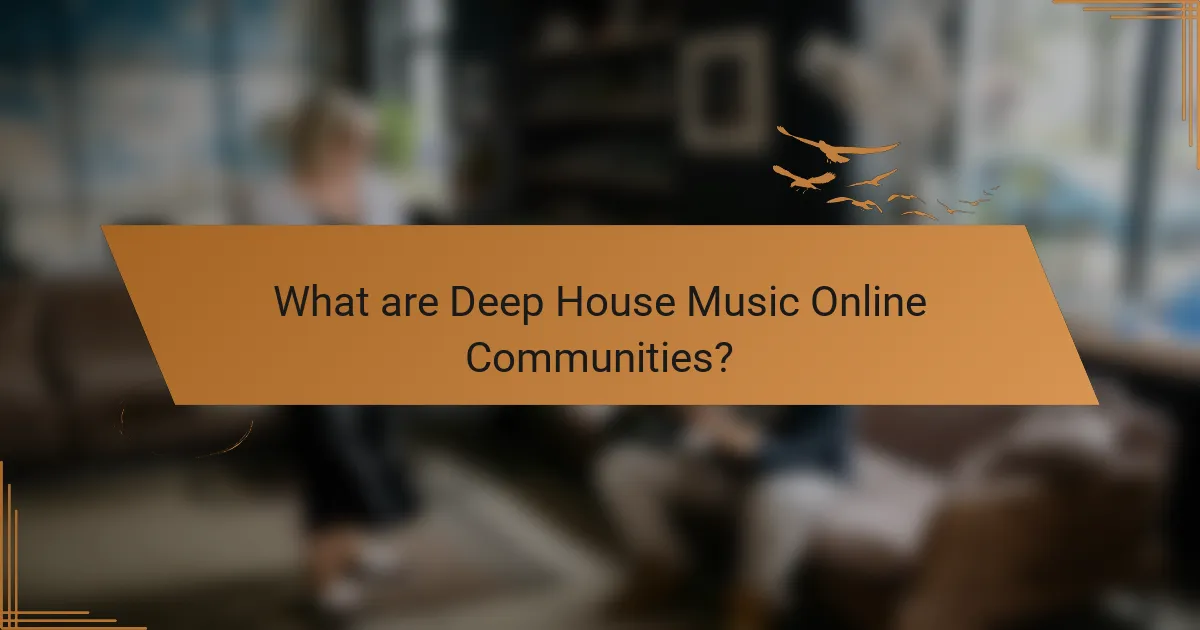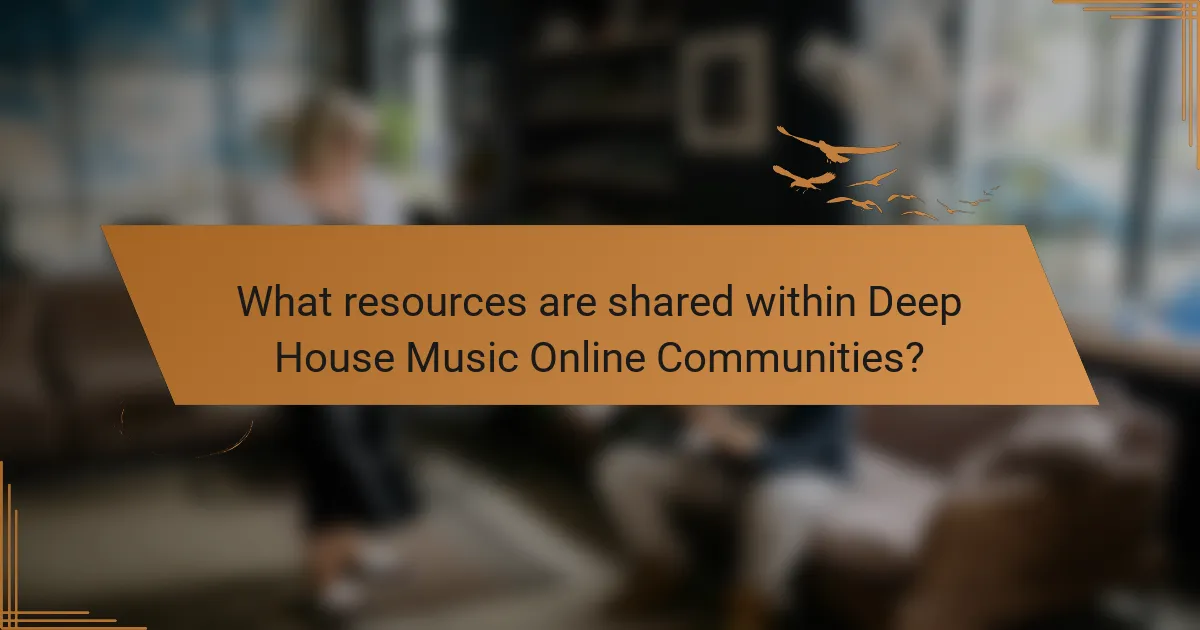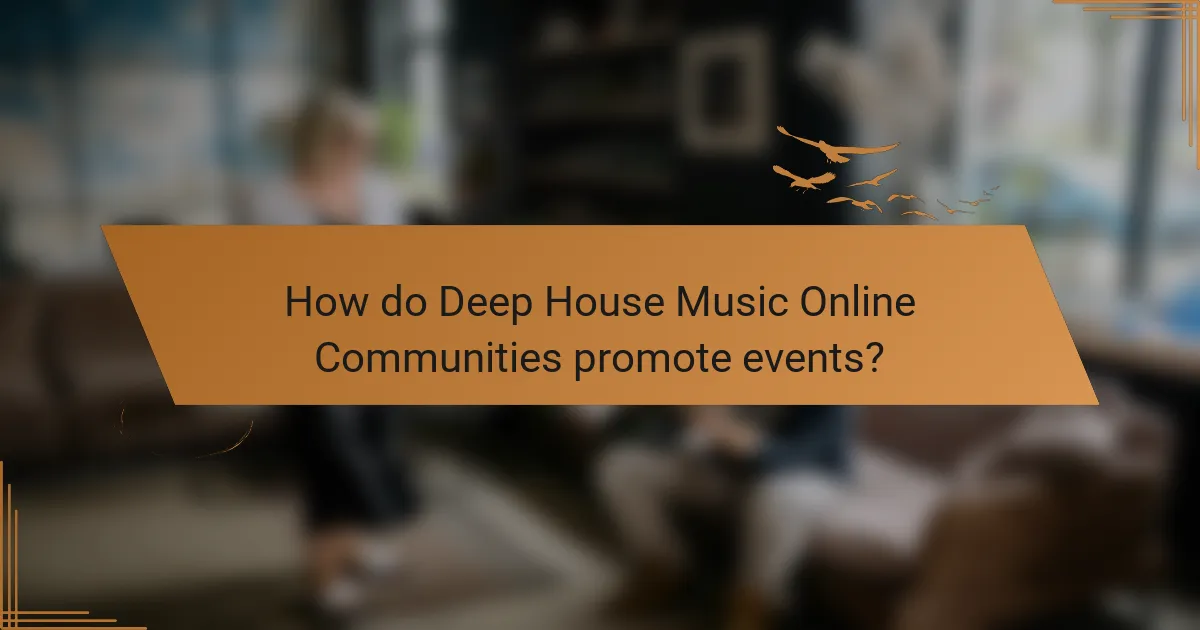Deep House Music Online Communities are digital platforms where enthusiasts engage in sharing and discussing deep house music. These communities serve as hubs for networking among artists, producers, and fans, facilitating the exchange of music tracks, production tips, and resources. Members promote events such as parties and festivals, utilizing social media and direct communication channels to enhance visibility and engagement. Through collaboration and support, these communities play a vital role in the growth and sustainability of the deep house music scene, fostering a vibrant environment for skill development and musical exploration.

What are Deep House Music Online Communities?
Deep House Music Online Communities are digital platforms where enthusiasts share and discuss deep house music. These communities facilitate networking among artists, producers, and fans. Members exchange resources such as tracks, mixes, and production tips. They often promote events like parties and festivals focused on deep house music. Popular platforms include forums, social media groups, and dedicated websites. These communities foster collaboration and support within the deep house genre. They enhance access to new music and emerging artists. Overall, they play a crucial role in the growth and sustainability of the deep house music scene.
How do these communities form and evolve?
Deep house music online communities form through shared interests in the genre. These communities often begin on social media platforms or music forums. Members connect over music preferences and seek to share resources. As members interact, they create a sense of belonging and identity. Events, such as live streams or virtual meetups, further strengthen these bonds. Over time, communities may evolve to include collaborations and collective projects. The growth is often driven by the desire for networking and support among artists and fans. Research shows that online communities thrive when members actively participate and contribute.
What platforms are most commonly used for Deep House music communities?
Deep House music communities commonly use platforms like SoundCloud, Mixcloud, Facebook, and Reddit. SoundCloud allows artists to share their tracks and connect with fans. Mixcloud is popular for sharing DJ mixes and radio shows. Facebook groups facilitate discussions and event promotions. Reddit hosts various subreddits dedicated to Deep House music. These platforms enable networking, resource sharing, and community engagement within the genre.
How do user demographics influence community dynamics?
User demographics significantly influence community dynamics by shaping interactions and participation levels. Age, gender, and geographic location affect how individuals engage within online communities. For example, younger users may prefer fast-paced communication and visual content. In contrast, older users might value detailed discussions and resource sharing.
Cultural backgrounds also play a role in shaping community norms and values. Diverse demographics can lead to a richer exchange of ideas and experiences. Conversely, homogenous groups may reinforce similar perspectives, limiting creativity.
Research indicates that communities with varied demographics often experience higher levels of innovation and collaboration. A study by Pew Research Center found that diverse online communities are more likely to generate unique content and foster inclusive environments. This highlights the importance of user demographics in driving community engagement and success.
Why are these communities important for Deep House music enthusiasts?
Deep House music communities are essential for enthusiasts because they foster connection and collaboration. These communities provide networking opportunities that allow fans to meet like-minded individuals. They facilitate resource sharing, including music recommendations and production tips. Additionally, communities promote events, helping members discover local and global gatherings. This engagement enhances the overall experience of Deep House music. Studies show that community involvement increases satisfaction and loyalty among music fans. Active participation in these groups can lead to discovering new artists and tracks. Thus, these communities significantly enrich the Deep House music culture.
What networking opportunities do they provide for artists and fans?
Deep house music online communities provide various networking opportunities for artists and fans. These platforms facilitate connections through forums, social media groups, and live chat features. Artists can showcase their work and collaborate with others in the genre. Fans can engage directly with artists through Q&A sessions and virtual meet-and-greets. Many communities host events such as live streams and virtual festivals, allowing fans to interact with artists in real-time. Additionally, these communities often share resources like tutorials and production tips, fostering skill development and collaboration. Overall, the networking opportunities enhance engagement and collaboration within the deep house music scene.
How do these communities contribute to the growth of the Deep House genre?
Deep House music communities contribute significantly to the genre’s growth through networking, resource sharing, and event promotion. These communities facilitate connections among artists, producers, and fans. They create platforms for collaboration, leading to new music and innovative sounds. Resource sharing includes tutorials, production tips, and access to sample packs, enhancing the skills of aspiring musicians. Event promotion activities increase the visibility of Deep House events, attracting larger audiences. For instance, online platforms often showcase local events, helping to build local scenes. This increased engagement fosters a sense of belonging and loyalty among fans. As a result, the genre continues to evolve and expand its reach globally.

What resources are shared within Deep House Music Online Communities?
Deep House Music Online Communities share various resources to enhance member engagement and knowledge. Members commonly exchange music tracks, including original productions and remixes. They also share production tips and techniques, fostering skill development. Additionally, community members provide links to software and plugins used in music creation. Event information, such as upcoming parties and festivals, is frequently shared. Collaborations between artists are encouraged and facilitated within these communities. Members often post tutorials and educational content to help others improve their craft. Networking opportunities arise through shared contacts and professional advice. These resources collectively contribute to a vibrant and supportive environment for deep house music enthusiasts.
What types of resources are commonly exchanged among members?
Members commonly exchange music tracks, production tips, and promotional materials. Music tracks include original compositions and remixes. Production tips encompass techniques, software recommendations, and tutorials. Promotional materials often involve flyers, social media posts, and event announcements. These exchanges foster collaboration and enhance skills. They also help members build their networks within the deep house music community. This sharing of resources is vital for growth and visibility in the music industry.
How do members share music production techniques and tips?
Members share music production techniques and tips through online forums, social media groups, and video tutorials. These platforms allow for real-time discussions and feedback. Members often post their projects for critique. They also share links to useful resources like software and plugins. Video tutorials on platforms like YouTube provide step-by-step guides. Live streams and webinars offer interactive learning experiences. Collaborative projects foster knowledge exchange among members. According to a survey by the Music Producers Guild, 70% of producers learn from peer interactions online. This highlights the importance of community in skill development.
What role do tutorials and educational content play in these communities?
Tutorials and educational content play a crucial role in deep house music online communities. They provide members with essential skills and knowledge for music production and DJing. These resources help beginners understand technical aspects like mixing and mastering. Experienced artists can share advanced techniques and tips through these tutorials. Educational content fosters collaboration and creativity within the community. It encourages members to share their own insights and experiences. This exchange of knowledge enhances the overall skill level of the community. Consequently, the community becomes more vibrant and innovative.
How do these communities facilitate collaboration among artists?
Deep House music online communities facilitate collaboration among artists through networking opportunities and resource sharing. These platforms allow artists to connect with each other, fostering relationships that can lead to collaborative projects. Members can share their work, receive feedback, and find inspiration from peers. Many communities host events, both virtual and in-person, that encourage collaboration. For example, collaborative remix projects often arise from connections made in these spaces. Additionally, these communities may provide access to exclusive resources like production tools and sample packs, enhancing collaborative efforts. The active exchange of ideas and support within these communities strengthens artistic ties and promotes creativity.
What are the common practices for collaboration within these spaces?
Common practices for collaboration within deep house music online communities include sharing music tracks and playlists. Members often exchange feedback on each other’s work. They frequently organize virtual events and live streams to showcase talent. Collaboration on remixes and production projects is also common. Members utilize social media platforms for networking and promoting events. They share resources like production tips and software recommendations. Active participation in discussions enhances community engagement. These practices foster a supportive environment for emerging artists.
How do collaborations impact the quality and diversity of music produced?
Collaborations enhance the quality and diversity of music produced by combining different artistic perspectives. When artists collaborate, they merge unique styles and influences. This fusion often leads to innovative sounds that may not emerge in solo projects. For example, a study by the University of Southern California found that collaborative efforts in music often result in higher creativity levels. Additionally, collaborations can introduce artists to new audiences, broadening their reach. This exposure can diversify the musical landscape, as artists blend genres and techniques. Ultimately, collaborations enrich the music industry by fostering creativity and expanding artistic boundaries.

How do Deep House Music Online Communities promote events?
Deep House Music Online Communities promote events primarily through social media platforms. They create event pages on Facebook, Instagram, and Twitter to reach a wider audience. Community members share these events within their networks, increasing visibility. Many communities utilize group chats on platforms like Discord and Telegram for direct communication. They often post regular updates, countdowns, and reminders to maintain engagement. Collaborations with local artists and DJs enhance event promotion. Some communities also host live streams or podcasts to discuss upcoming events. This multi-channel approach effectively attracts attendees and fosters community involvement.
What methods are used for event promotion within these communities?
Event promotion within deep house music online communities primarily utilizes social media platforms. These platforms facilitate direct engagement with fans and potential attendees. Communities often create event pages on Facebook or Instagram to share details and updates. Additionally, they leverage group chats and forums to disseminate information quickly. Influencer partnerships are common, where popular DJs or producers promote events to their followers. Email newsletters are also used to reach dedicated fans with event announcements. Finally, collaborations with local venues enhance visibility and credibility for the events.
How do online communities enhance event attendance and participation?
Online communities enhance event attendance and participation by fostering engagement and connection among members. These platforms facilitate discussions about upcoming events, creating buzz and excitement. They allow members to share experiences and insights, which can motivate others to attend. Social proof plays a significant role; when community members express interest, it influences others to join. Additionally, online communities often provide exclusive content or early access to event tickets, increasing participation rates. Research indicates that events promoted within active online communities see higher attendance rates, as members feel a sense of belonging and commitment.
What role do social media platforms play in event promotion?
Social media platforms play a crucial role in event promotion by providing a wide-reaching and interactive space for engagement. They enable event organizers to share details, updates, and multimedia content related to the event. Platforms like Facebook, Instagram, and Twitter facilitate targeted advertising to specific demographics. This targeted approach can significantly increase event visibility and attendance.
According to a study by Eventbrite, 93% of event creators use social media to promote their events. This statistic highlights the reliance on these platforms for outreach. Additionally, social media allows for real-time interaction, enabling potential attendees to ask questions and share their excitement. This engagement can foster a sense of community around the event.
Furthermore, user-generated content from attendees can amplify promotion through organic sharing. Hashtags and event pages create a central hub for information and discussion. Overall, social media platforms are essential tools for maximizing reach and engagement in event promotion.
What are the best practices for promoting events in Deep House communities?
Utilizing social media platforms is essential for promoting events in Deep House communities. Engaging visuals and videos can capture attention effectively. Create event pages on platforms like Facebook and Instagram to facilitate sharing. Collaborate with local artists and influencers to reach wider audiences. Use targeted ads to reach specific demographics interested in Deep House music. Leverage community forums and groups to share event details directly with enthusiasts. Consistent updates and reminders about the event can maintain interest and excitement. Finally, consider partnerships with local venues to enhance credibility and visibility.
How can members effectively leverage their networks for successful events?
Members can effectively leverage their networks for successful events by actively engaging with their connections. Engaging includes sharing event details and inviting feedback. Collaboration with fellow members enhances event visibility. Utilizing social media platforms increases outreach to diverse audiences. Members should also attend networking events to establish personal connections. Sharing resources, such as promotional materials, can amplify event impact. According to a study by the Network for Professional Women, 80% of successful events are linked to strong networking efforts. This data underscores the importance of leveraging networks for event success.
What tools and resources can help streamline event promotion activities?
Social media platforms like Facebook and Instagram are essential tools for event promotion. They allow event organizers to reach a broad audience quickly. Email marketing services such as Mailchimp facilitate targeted communication with potential attendees. Event management software like Eventbrite simplifies ticket sales and registration processes. Graphic design tools like Canva enable the creation of visually appealing promotional materials. Online community forums and groups, especially those focused on deep house music, provide networking opportunities and resource sharing. Analytics tools can track engagement and effectiveness of promotional efforts, helping to refine strategies.
What tips can enhance participation in Deep House Music Online Communities?
Engaging actively in discussions enhances participation in Deep House Music online communities. Members should share personal insights and experiences related to deep house music. Regularly posting relevant content, such as track recommendations, mixes, or event announcements, fosters interaction. Encouraging feedback on shared content increases member engagement. Organizing virtual meetups or listening parties promotes community bonding. Utilizing polls or questions can spark conversations and gather opinions. Highlighting member contributions acknowledges their efforts and motivates further participation. Lastly, maintaining a positive and inclusive atmosphere attracts new members and retains existing ones.
Deep House Music Online Communities are digital platforms that connect enthusiasts, artists, and producers within the deep house genre. These communities facilitate networking, resource sharing, and event promotion, enhancing the overall experience for members. Key topics include the formation and evolution of these communities, the impact of user demographics on community dynamics, and the types of resources exchanged among members. The article also explores how these communities contribute to the growth of the deep house genre and provide valuable networking opportunities for artists and fans alike. Additionally, effective event promotion strategies and best practices for enhancing participation within these communities are discussed.
